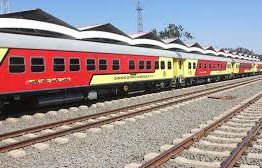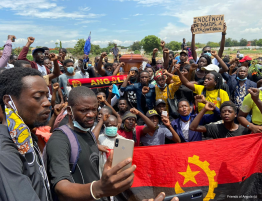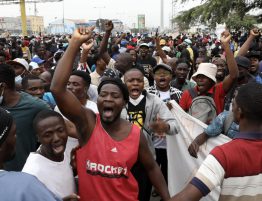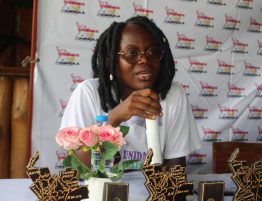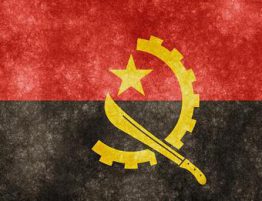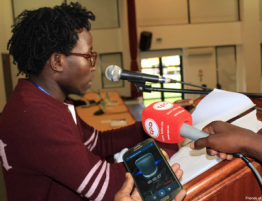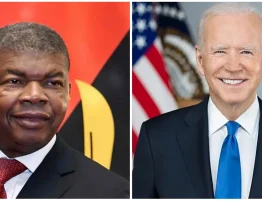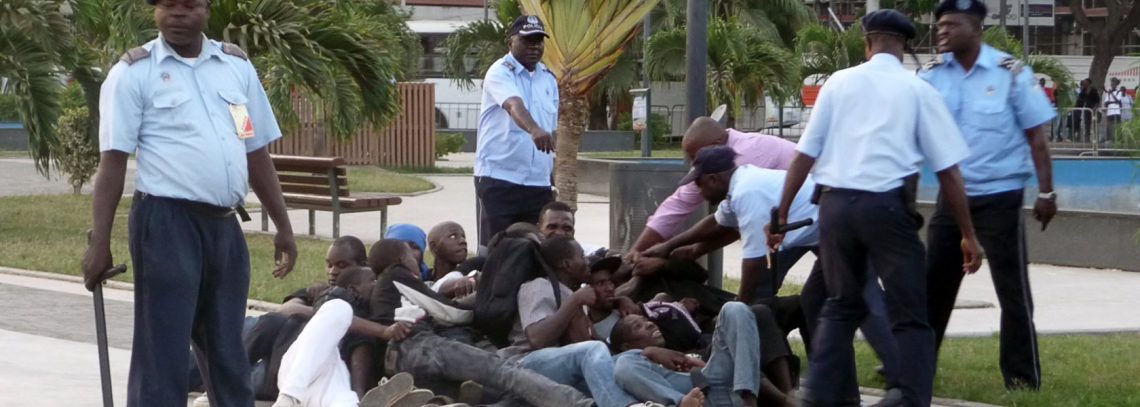
Angola should not have been elected to the UN Human Rights Council today, as it fails to meet the basic membership criteria. See full UN Watch report on candidates here.
Angola’s Human Rights Record
Angola commits serious human rights violations, including:
Torture
Cruel, inhuman or degrading punishment
Restrictions on freedom of assembly
Restrictions on free speech
Restrictions on free press
Corruption
Impunity
Unlawful deprivation of life
Potentially life-threatening prison conditions
Arbitrary arrest and detention
Lack of due process
Judicial inefficiency
Forced evictions without compensation
Violence against women and children
Child labor
Trafficking in persons
Forced labor
Discussion
Angola’s president José Eduardo dos Santos was one of the longest serving African presidents before he stepped down in August 2017 after 38 years in power. [1] His reign was characterized by endemic government corruption, economic crisis, inflation, poor health indicators and widespread poverty. [2] It remains to be seen whether dos Santos’ chosen successor, João Manuel Gonçalves Lourenço, of the ruling MPLA party, will stick to his promise to fight the corruption.
Angola is Africa’s second largest oil producing country. Yet, despite the one-time opportunity for rebuilding which Angola received when its nearly 30-year civil war ended in 2002, outgoing President dos Santos exploited the country’s resources to enrich himself and his inner circle, leaving ordinary Angolans to languish in poverty. [3] While dos Santo’s oldest daughter, Isabel, is Africa’s richest woman with estimated wealth of $2.3 billion, and other family members amassed fortunes, one third of the population lives on less than $2 a day. [4] One government insider was recently quoted as saying that government spending on reconstruction was “like opening a window and throwing out money,” because billions of dollars disappeared into individuals’ pockets. [5]
Angola’s 14-year post-war economic boom was followed by a sharp downturn in 2016 as the price of oil declined. Now, there is 30% inflation and government services have deteriorated. [6]
According to Human Rights Watch, Angola has one of the highest child mortality rates in the world with one in five children dying before age five. In 2016, Angola failed to adequately deal with outbreaks of Yellow Fever and Malaria because of lack of medication and supplies due to budget cuts. Almost 3,000 people died from Malaria in the first quarter of the year. [7]
Angolan security forces committed serious human rights violations with impunity. For example, in April 2016, at least three demonstrators were wounded by police gunfire; in August 2016, security forces killed a 14-year-old boy during a peaceful protest against forced evictions; in August 2016, an officer of a private security firm with government ties reportedly shot and killed a 17-year-old boy. [8]
Security forces were also responsible for beatings and torture. In one case from August 2016, a suspected gang member was tortured and killed in police custody. There were also several cases of police arbitrarily detaining protesters in advance of demonstrations and beating protesters. [9]
While the law officially provides for freedom of expression, the government owned or controlled most media and journalists practiced self-censorship. In 2016, the legislature approved several new restrictive laws giving the government greater control of both traditional and online media. [10]
Furthermore, government authorities arrested, harassed and intimidated journalists and denied them access to information. In January and June 2016, the government charged two journalists with defamation after they reported on government corruption. In August 2016, a team of Novo Jornal journalists were stopped, searched and threatened by security forces while visiting a demolition site and one of the journalists was beaten. In May 2016, another journalist was detained and beaten while reporting on a street altercation he had witnessed. [11]
U.N. Voting Record
Negative: At the General Assembly, Angola backed human rights abusers through a resolution denying the right to sanction such regimes, by voting to delay the work of the Special Rapporteur on violence against LGBT, and by voting against a resolution to protect human rights defenders. Angola abstained on resolutions that spoke out for human rights victims in Iran, Syria and North Korea.
[1] Kevin Sieff, “He outlasted Reagan, Castro and Gorbachev. Now Angola’s 74-year-old leader is stepping down,” Washington Post, August 23, 2017, available at http://www.washingtonpost.com/world/africa/he-outlasted-reagan-castro-and-gorbachev-now-angolas-78-year-old-leader-is-stepping-down/2017/08/22/90753f6f-6f66-4979-b7d7-2e1c95d855ab_story.html?utm_term=.38662caf776a.
[2] Anita Powell, “Angola’s Economic Woes Top of Citizens’, New President’s Priority List,” Voice of America, August 29, 2017, available at http://www.voanews.com/a/angola-economic-woes-top-of-citizen-new-president-priority-list/4003691.html; “Angola 2016 Human Rights Report,” U.S. Department of State, 2017, available at http://www.state.gov/j/drl/rls/hrrpt/humanrightsreport/index.htm?year=2016&dlid=265222.
[3] Norimtsu Onishi, “Angola’s Corrupt Building Boom: ‘Like Opening a Window and Throwing Out Money,’” The New York Times, June 24, 2017, available at http://www.nytimes.com/2017/06/24/world/africa/angola-luanda-jose-eduardo-dos-santos.html?mcubz=0.
[4] Henrique Almeida and Candido Mendes, “Angola Enters a New Political Era With Its Economy Struggling,” Bloomberg, August 22, 2017, available at http://www.bloomberg.com/news/articles/2017-08-21/skyscrapers-stand-unfinished-as-angolan-election-marks-new-era.
[5] Norimtsu Onishi, “Angola’s Corrupt Building Boom: ‘Like Opening a Window and Throwing Out Money,’” The New York Times, June 24, 2017, available at available at http://www.nytimes.com/2017/06/24/world/africa/angola-luanda-jose-eduardo-dos-santos.html?mcubz=0.
[6] Henrique Almeida and Candido Mendes, “Angola Enters a New Political Era With Its Economy Struggling,” Bloomberg, August 22, 2017, available at available at http://www.bloomberg.com/news/articles/2017-08-21/skyscrapers-stand-unfinished-as-angolan-election-marks-new-era; Kevin Sieff, “He outlasted Reagan, Castro and Gorbachev. Now Angola’s 74-year-old leader is stepping down,” Washington Post, August 23, 2017, available at available at http://www.washingtonpost.com/world/africa/he-outlasted-reagan-castro-and-gorbachev-now-angolas-78-year-old-leader-is-stepping-down/2017/08/22/90753f6f-6f66-4979-b7d7-2e1c95d855ab_story.html?utm_term=.38662caf776a.
[7] Human Rights Watch, World Report 2017, Angola country chapter, available at http://www.hrw.org/world-report/2017/country-chapters/angola.
[8] “Angola 2016 Human Rights Report,” U.S. Department of State, 2017, p. 2, available at http://www.state.gov/j/drl/rls/hrrpt/humanrightsreport/index.htm?year=2016&dlid=265222.
[9] Amnesty International 2016/2017 Report, Angola, available at http://www.amnesty.org/en/countries/africa/angola/report-angola/.
[10] “Angola 2016 Human Rights Report,” U.S. Department of State, 2017, pp. 12-13, available at http://www.state.gov/j/drl/rls/hrrpt/humanrightsreport/index.htm?year=2016&dlid=265222; Freedom in the World 2017: Angola Profile, Freedom House, available at http://freedomhouse.org/report/freedom-world/2017/angola.


